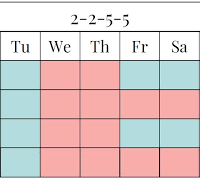Custody/Access Schedules for Children

One of the biggest concerns of parents during a divorce or custody action is the custody/access schedule for their children. For many parents who live together with their children, the thought of not seeing their children every day is overwhelming. So, most parents meeting with an attorney are going to ask, “what type of custody schedule will the court order” or “how do we know what type of schedule will be best for the children.” Unfortunately, as with many things, there is not a straightforward, one-size-fits-all answer.
In Maryland, there is no presumption in favor of one parent or the other and while studies show (and courts recognize) that children having meaningful, healthy relationships with both parents is best for children in the long run, there is no “access” schedule that is best for everyone. Custody and access schedules are typically determined based on the best interests of the child. The court may consider various factors including but not limited to the child’s age, the relationship with each parent, the ability of each parent to provide for the child’s needs, any history of abuse or neglect, each parent’s ability/willingness to share custody, and the geographical location of each parent’s home.
In general, the best way to determine an access schedule for your children is to agree with the other parent based on the children’s needs. While there are certainly circumstances where that is not possible (because one parent is being unreasonable, there is a fundamental disagreement about what is best for the children, or there is no room for negotiation by one or both parents), parents know their children best. If you are able to reach an agreement, with the input of both parents, schedules tend to be specifically tailored to your children’s specific needs. Trying a custody case in front of a judge means a third-party (the judge) is going to determine an access schedule for your children, whom in 99% of cases the judge will never meet, based on what they believe is best. While judges make their best efforts to determine what is best for the children, they will never have all the details that parents do that impact what could be best for the children. Typically, judges will choose a time-tested schedule that has worked well for a majority of children in similar situations in the past. There are many times neither parent is happy with a schedule the judge chooses for them.
There are several “basic” custody schedules that have been developed by judges/attorneys/parents over the years that are typical in custody schedules. If parents agree, there are hundreds of ways to modify the typical schedules to suit the needs of a child, but for the purposes of providing examples, some of the typical schedules (which are also utilized by courts in making decisions) are:
Every Other Weekend: One parent has primary custody of the children during the week (typically during the school year). The schedule typically works on a two-week rotation and looks something like this:
| Mon. | Tues. | Wed. | Thurs. | Fri. | Sat. | Sun. | |
| Week 1 | Parent A | Parent A | Parent A | Parent A | Parent B | Parent B | Parent B |
| Week 2 | Parent A | Parent A | Parent A | Parent A | Parent A | Parent A | Parent A |
An every-other-weekend schedule works well when one parent lives further from the children’s school to reasonably bring the children to school on time every morning without having the children wake up extraordinarily early, or if a parent’s work schedule prevents them from being able to primarily take the children during the week.
Some possible variations on the every-other-weekend schedule are to have a “week-night” dinner for the non-primary parent so they are able to see the children during the week, or even have a set “overnight” during the week for the non-primary parent (for example, the non-primary parent gets every Tuesday or Wednesday overnight).
Extended Every Other Weekend Schedule: This is still not an equal access schedule, but the non-primary parent has the children for more than just the “weekend time.”
| Mon. | Tues. | Wed. | Thurs. | Fri. | Sat. | Sun. | |
| Week 1 | Parent A | Parent A | Parent A | Parent B | Parent B | Parent B | Parent B |
| Week 2 | Parent B | Parent A | Parent A | Parent A | Parent A | Parent A | Parent A |
2-2-3 Schedule: This is an equal access schedule that rotates so that neither parent has the children for more than three (3) overnights at a time. Developmentally, this works well for infants/very young children, but can be very confusing for parents to keep track of because each week switches weekdays. This schedule can also be difficult for younger school-aged children (elementary/middle school) for the same reason.
| Mon. | Tues. | Wed. | Thurs. | Fri. | Sat. | Sun. | |
| Week 1 | Parent B | Parent B | Parent A | Parent A | Parent B | Parent B | Parent B |
| Week 2 | Parent A | Parent A | Parent B | Parent B | Parent A | Parent A | Parent A |
2-2-5-5 Schedule: This is an equal access schedule that sets the “week-day” schedule so the parents and children know where the children are going to be each day during the week and then weekends rotate. It is generally easier for children and parents to follow, but there is a 5 day period each week where the non-custodial parent does not see the children.
| Mon. | Tues. | Wed. | Thurs. | Fri. | Sat. | Sun. | |
| Week 1 | Parent B | Parent B | Parent A | Parent A | Parent B | Parent B | Parent B |
| Week 2 | Parent B | Parent B | Parent A | Parent A | Parent A | Parent A | Parent A |
Week-on/Week-off Schedule: This is an equal access schedule where one parent has the children for a week at a time.
| Mon. | Tues. | Wed. | Thurs. | Fri. | Sat. | Sun. | |
| Week 1 | Parent A | Parent A | Parent A | Parent A | Parent A | Parent A | Parent A |
| Week 2 | Parent B | Parent B | Parent B | Parent B | Parent B | Parent B | Parent B |
Summer Schedules: Summer schedules can be the same, or different, from regular access schedules. If parents live hours apart and regular school year access is not feasible, then many times the non-primary parent will have a majority/all of the summer access. Other times, if one party has primary custody during the school year but the parties live close enough to do exchanges every week, the summer schedule could be a week-on/week-off schedule during the summer. The possibilities truly are endless, but the above schedules generally give a good baseline for parents to consider when coming up with schedules.
Once you have a basic schedule, you will want to consider vacation time, holidays/special days and any other family-specific events to ensure continuity for your children.
The biggest thing to keep in mind when developing the access schedule is (and this should go without saying) your children and their needs. For extremely young children (infants to 1.5-2 years), attachment is formed very differently; developmental studies show that frequent access to both parents helps them bond with both parents. As such, most attorneys and judges (and certainly the psychological community) do not recommend a week-on/week-off schedule because there is too much time between seeing each parent. However, when children are teenagers and have friends, activities, after-school sports, etc., a week-on/week-off schedule is generally preferable because it is easy to track and does not require them switching houses mid-week. Some children handle frequent transitions better while others prefer a more “routine” schedule. It is important to think of what will work for your children, not what works for your neighbor or family members’ children.
Developing a custody schedule can be difficult. Experienced attorneys are able to help guide you through that process and help you come up with a schedule that works best for you and your family. In the event you are not able to agree to a schedule, then attorney can help you effectively present your case to the court about what you believe is the best schedule for children. Keep in mind, the above schedules are just some of the typical schedules for your consideration and can/should be modified based on your family’s specific circumstances.









